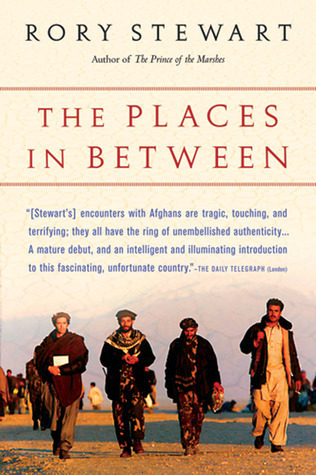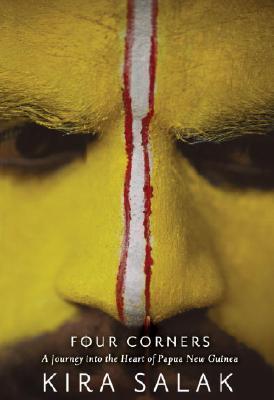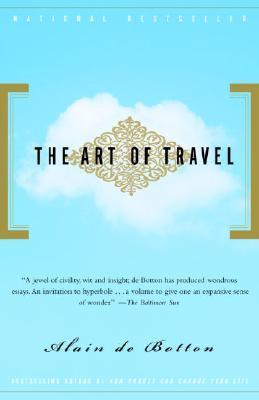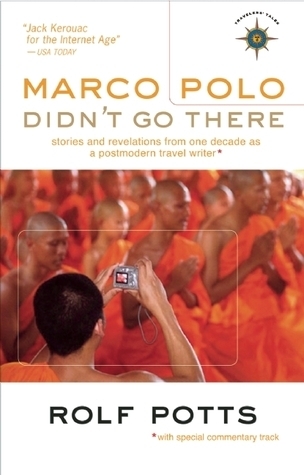Why Travel?
In this modern age of pop psychologists obsessed with analyzing everything human to the point of despair and beyond, every travel writer at some point in his story will eventually be required to confront the question of why he or she is travelling. The question is a legitimate one, of course, and in those cases where the catalyst behind the journey is a compelling one, exploration of the idea can add to the story. It seems to me, however, that at some point in history the demand for a psychoanalytical justification for every little thing that we do in life crossed over the threshold of reasonable restraint, ultimately becoming a pointless compulsion more often than an exercise in illumination. In reading the reviews of travel writing critics, or listening to friends disregard Kira Salak’s gutsy journey across Papua New Guinea as nothing more than unhealthy attempt to address psychological issues, I think of Albert Camus’ advice that, “You will never be happy if you continue to search for what happiness consists of. You will never live if you are looking for the meaning of life.” Sometimes the inward journey prompted by questioning one’s motivations bears worthwhile fruits, and I definitely do not challenge the value of such a journey, but sometimes, I think, it may be useful to keep in mind that sometimes a cigar is just a cigar, and sometimes a traveler just wants to travel.
In this article I want to talk about the way in which four travel writers approach the question of “why” in their stories. Each author contends with the issue at some point, though each with his or her own degree of seriousness. On one extreme is the aforementioned Kira Salak who, in her book Four Corners, makes her psychological journey one of the cornerstones of the story, until the inward quest into her motivations becomes every bit as pronounced as the physical trek across New Guinea. Alain de Botton’s Art of Travel, in a less personal way, makes exploration of travelers’ motivations and experiences the catalyst for exploring lines of intellectual inquiry that weave together art history, biography, philosophy, and seemingly every other disparate area of knowledge available. In The Places in Between, Rory Stewart seems almost annoyed at the need for explaining his motivations, offering only offhand justifications, as though conceding to the unfortunate necessity but never really becoming willing to concern himself with it too much. Rolf Potts’ Marco Polo Didn’t Go There, meanwhile, openly embraces the existential absurdity of being a traveler in an increasingly homogenized world where cultures are becoming more and more difficult to distinguish from each other and almost no place is left that is more than a power switch away from everything else.
Kira Salak, more than any other author written of in this article, embraced the role of self-psychoanalyst in her book Four Corners. Indeed, she starts and ends the book not with dramatic scenes or images from New Guinea, but with childhood memory and psychological insight. At points, Salak’s walk across Papua New Guinea seems almost like a backdrop for her introspective musings. Her approach, in my opinion, does not diminish from the tale, and gives it an extra dimension. The confessional style of her book is, in some ways, more courageous than the actual journey she made. I doubt that Thor Heyerdahl would have risked his iconic status as an adventurer by exploring the childhood fears of inadequacy that drove him to board Kon-Tiki.
What I think did detract from Salak’s book was her penchant for reiterating how dangerous and miserable her journey was, and how brave and brash she was for making it. Salak tries so hard to remind the audience that what she was doing was fraught with peril that she ends up almost sounding silly, like a drunken frat boy telling football stories to pick up chicks. The final effect of her overly repetitive emphasis on danger is the exact opposite of her intent, so that by the time she writes, “I still travel, but I don’t go to the really dangerous places anymore because I’m no longer in the game of proving anything to anyone,” I didn’t believe her. Like an inverted version of Hemingway’s iceberg, Salak shows so much that the overall story loses depth. She ultimately answers her ‘why’ quite clearly, but the way that she presents her story leaves a little doubt as to whether or not she learned anything from it.
Alain de Botton takes an interesting approach to investigating the reasons we travel in The Art of Travel: he places them at the very center. His own travels become catalysts for his musings and he lets his meandering inquiries become the real adventure, placing himself all the way in the background and highlighting ideas and curiosity over physical danger or hardship.
My favorite essay in de Botton’s collection, and the one which I believe is most exemplary of his style, was On Travelling Places. In this essay, the author’s stop at a service station on the roadway between London and Manchester becomes the starting point for a journey into the value of those places that exist between destinations. The station, he explains, is “architecturally miserable, it smelt of frying oil and lemon scented floor polish, the food was glutinous and the tables were dotted with islands of dried ketchup from the meals of long-departed travelers,” but he sees a sort of lonely poetry in it, too, which launches him into an investigation on the appeal of the “liminal travelling places” of the world, an investigation which melds the life of Charles Baudelaire, the work of Edward Hopper, and de Botton’s own experiences. He weaves the threads together so gracefully that the three ideas end up seeming intrinsically linked, and not a product of his ruminations at all.
De Botton talks about how Baudelaire, immensely dissatisfied with his home life throughout his years, learned to love travel for travel’s sake. He became, “strongly drawn to harbours, docks, railway stations, trains, ships and hotel rooms, and felt more at home in the transient places of travel than in his own dwelling.” Baudelaire also loved “machines of motion.” From a recounting of the motivation of Baudelaire’s affection for travel places, de Botton moves into the story of Edward Hopper, a painter influenced by Baudelaire, whose work focused on those lonely places in between that de Botton is concerned with in this essay. Here, the author moves away from biography and delves into art theory, “The collective loneliness brought to mind certain canvasses by Edward Hopper, which, despite the bleakness they depict, are not themselves bleak to look at but rather allow the viewer to witness an echo of his or her own grief and thereby to feel less personally persecuted and beset by it.” It is this kind of offhand philosophizing that makes the essay, and the book as a whole, replacing the intrigues of physical adventure with the intellectual excitement of making new mental connections, an excitement which I think is, in many ways, more satisfying than physical adventure alone.
 In The Places In Between, Rory Stewart writes, “I’m no good at explaining why I walked across Afghanistan. Perhaps it was because it was an adventure.” And that is about the extent of his explanation. He has offhand replies for the people he meets along the way, things such as “walking for peace” and being “interested in the environment,” but he never seems to take any of those explanations seriously. I found his approach to the “why” question interesting because, more than any other author read for this book review, Stewart could easily have made a case for some kind of grand, heroic purpose in his journey. A Westerner walking across the war torn landscape of Afghanistan has all the makings of a great martyr tale or heroic journey, but Stewart refuses to play either part, a fact which is doubly admirable considering all that he went on to do for Afghanistan after writing the book.
In The Places In Between, Rory Stewart writes, “I’m no good at explaining why I walked across Afghanistan. Perhaps it was because it was an adventure.” And that is about the extent of his explanation. He has offhand replies for the people he meets along the way, things such as “walking for peace” and being “interested in the environment,” but he never seems to take any of those explanations seriously. I found his approach to the “why” question interesting because, more than any other author read for this book review, Stewart could easily have made a case for some kind of grand, heroic purpose in his journey. A Westerner walking across the war torn landscape of Afghanistan has all the makings of a great martyr tale or heroic journey, but Stewart refuses to play either part, a fact which is doubly admirable considering all that he went on to do for Afghanistan after writing the book.
Stewart’s modesty is apparent in his writing style, as well, the final effect of which is exactly opposite to that of Salak’s in Four Corners. Stewart never emphasizes the danger he is in. After a run-in with the Taliban, who tell him he had been one slip away from being killed, Stewart replies simply, “I hardly took in the scenery over the next hour. My emotions seemed muted. It occurred to me that being threatened by the Taliban made a good anecdote, but mostly I thought about the conversation with distaste and frustration.” There is something powerful in that kind of understatement. Not to overuse the reference, but I am reminded again of Hemingway’s iceberg and the power of the unseen lurking below the surface. Stewart’s literary stoicism gives the book a ‘manly man’s’ feel, much more than any macho posturing or braggadocio ever could, and the way that he reserves his one display of vulnerability to pay respect for his dead dog, Babur, is both fitting and touching, “I don’t imagine Babur would have been very impressed to see me crying now, trying to bring back five weeks’ walking alone together, with my hand on a grizzled golden head, which is Babur, beside me and alive.” Stewart’s book was my favorite among those that I’m reviewing here. Having been in Afghanistan under different circumstances, I was envious of his journey and enjoyed reading it. I also have a great respect for the author for going on such an epic journey while refusing to even once admit that there is anything epic about it.
Rolf Potts, in Marco Polo Didn’t Go There, addresses the “why” questions of a travel writer in a kind of meta-travel-fiction. His book is a series of short travel stories supplemented with insights into the techniques of travel writing. In the first essay, Storming the Beach, Potts sets out to infiltrate the set of the movie The Beach, being filmed at that time on a Thai island. Potts makes little apology for the fact that he is basically making his trip just to see what happens. “In any travel story, there’s bound to be a bit of artifice when it comes to defining the quest,” he writes in his notes, “Nevertheless, some people harbor a sentimental notion of how travel stories ought to work.” With the story itself he is equally self-effacing in discussing the motivations for what he does, “Or, to put it another way–Regardless of one’s budget, itinerary and choice of luggage–the act of travel is still, at its essence, a consumer experience.” In reading Potts’ writing as a whole, however, it becomes clear that his irreverence towards the subject of travel’s motivations comes not from a trivial take on the matter, but from deep and heartfelt contemplation.
Potts is unapologetic in his approach to travel and travel writing, and why shouldn’t he be? It isn’t his fault that he was born into a time when the black spaces of the maps have all been filled in. Travelers today fly thousands of miles to compare their Nike sneakers with those worn by Tibetan Sherpa’s, and that isn’t their fault either. Potts refuses to hide from these facts of modernity, making them instead the core of his explorations. He laughs at the irony of The Beach’s crew planting no less than 73 trees on the island they were filming on, because its natural state did not look authentic enough for their movie. Potts swims right into the heart of this irony laughing, but in looking at his greater preoccupation with the current state of the world, it is a kind of noble laughter. When did adventure, he seems to ask, when did sucking the marrow out of life and sounding our barbaric yawp become something in need of defense? After all, if the question of why we travel is a legitimate one, then isn’t the question of why we feel compelled to ask why equally so? Potts faces the existential questions raised by living in a world increasingly devoid of the exotic, embraces those concepts, and then, like any good absurdist hero, goes running off into adventure, anyway. What the hell else is he supposed to do?
~ Jeff Suwak.
No different than a bird singing, really. I write because writing is what I do.








